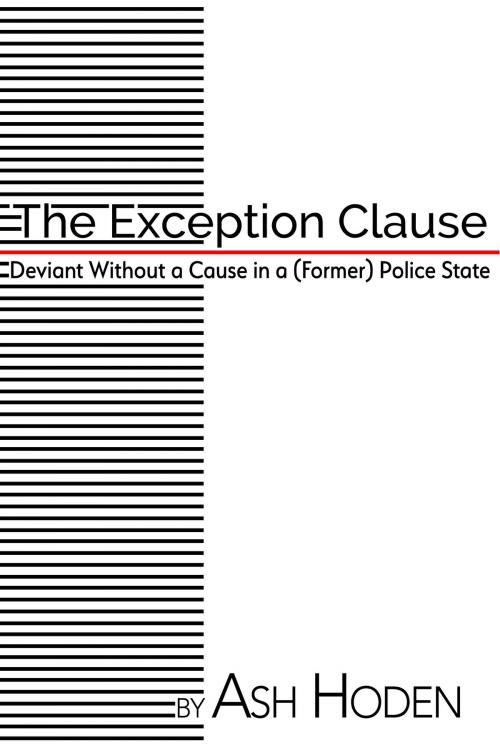The Exception Clause
Deviant Without a Cause in a (Former) Police State
Nonfiction, Religion & Spirituality, Philosophy, Ethics & Moral Philosophy, Travel, Adventure & Literary Travel, Biography & Memoir| Author: | Ash Hoden | ISBN: | 9780988542327 |
| Publisher: | Deviation, LLC | Publication: | August 18, 2018 |
| Imprint: | Language: | English |
| Author: | Ash Hoden |
| ISBN: | 9780988542327 |
| Publisher: | Deviation, LLC |
| Publication: | August 18, 2018 |
| Imprint: | |
| Language: | English |
Years before Myanmar’s persecution of Rohingya muslims made international headlines, Ash Hoden was there. Documenting the sights and insights of an unsanctioned motorbiking exploit through forbidden regions of the country, The Exception Clause: Deviant Without a Cause in a (Former) Police State reveals much more than a glimpse of the social and environmental conditions in this oppressed, unsettled nation. Altogether ignorant of the boundaries in which foreign visitors are meant to constrain their activities, on an “informally” rented and operated motorbike he crosses an array of legal and geographical lines. Seeing much more than the routine tourist script, each encounter or new discovery leads to an increasingly clarified impression of Myanmar as a whole. Layered into the adventure, elucidated piece by piece with each twist and turn, are the core principles of Deviation — the ethical pursuit of an exquisitely less obedient life. Backed by excerpts from academic texts and historical visionaries, the meaning and excitement of Deviation blossoms in tandem with the meaning and excitement of the journey itself.
Falsely (naively?) assuming Myanmar’s imposed economic isolation equates to an abundance of raw wilderness, Ash sought jungles and waterfalls. Instead, he finds clear-cut forests and an incoherent state whose existence depends on extraction. Rather than isolating and preserving Burma’s resources, international sanctions exposed the nation to rampant pilfering by its military regime. With no forests to explore he struggles to accept that he's on such a seemingly pointless endeavor: aimlessly driving a mechanically impaired Chinese motorbike down one jagged road from sucky here to sucky there. Ash is deviant without a cause.
However, the reality of Burma’s distinct cultural condition, preserved by force in a vague midpoint between tradition and modernity, more pungently reveals itself the further he deviates from government sponsored tourist agendas. After weeks on the road, having endured perilous mountain crossings, detainment in a remote military outpost, infected injuries and sinuses, and countless other hardships, these two narratives — the reflective and adventurous — make a sopping climax over the new year water festival. Caught between the traditional practice of bathing the feet of village elders and the contemporary party atmosphere found in select urban-ish settlements, the rural water festival is a coordinated attack on all outsiders. And what could be more outside than a long-haired foreigner illegally traipsing through town on motorbike?
“The Myanmar Situation,” he learns, is a fledgeling, incoherent conglomerate of ethnicities and folk tribes, all struggling to survive a military regime that is intolerant of a modernizing nation despite its grand vision of becoming a modernized state. Directly relevant to US history, it is a window through which the preliminary stages of constructing a nation-state can be witnessed in simulacra, complete with the need to establish a religion-based national identity in order to homogenize disparate tribes and cultures into a uniform, contemporary notion of “the People.” In order to create a more singular and coherent society grounded by modern social values the democratization of Myanmar’s state will also require Myanmar to modernize as a nation. But progress will be painful, as the non-Buddhist Rohingya can attest.
Years before Myanmar’s persecution of Rohingya muslims made international headlines, Ash Hoden was there. Documenting the sights and insights of an unsanctioned motorbiking exploit through forbidden regions of the country, The Exception Clause: Deviant Without a Cause in a (Former) Police State reveals much more than a glimpse of the social and environmental conditions in this oppressed, unsettled nation. Altogether ignorant of the boundaries in which foreign visitors are meant to constrain their activities, on an “informally” rented and operated motorbike he crosses an array of legal and geographical lines. Seeing much more than the routine tourist script, each encounter or new discovery leads to an increasingly clarified impression of Myanmar as a whole. Layered into the adventure, elucidated piece by piece with each twist and turn, are the core principles of Deviation — the ethical pursuit of an exquisitely less obedient life. Backed by excerpts from academic texts and historical visionaries, the meaning and excitement of Deviation blossoms in tandem with the meaning and excitement of the journey itself.
Falsely (naively?) assuming Myanmar’s imposed economic isolation equates to an abundance of raw wilderness, Ash sought jungles and waterfalls. Instead, he finds clear-cut forests and an incoherent state whose existence depends on extraction. Rather than isolating and preserving Burma’s resources, international sanctions exposed the nation to rampant pilfering by its military regime. With no forests to explore he struggles to accept that he's on such a seemingly pointless endeavor: aimlessly driving a mechanically impaired Chinese motorbike down one jagged road from sucky here to sucky there. Ash is deviant without a cause.
However, the reality of Burma’s distinct cultural condition, preserved by force in a vague midpoint between tradition and modernity, more pungently reveals itself the further he deviates from government sponsored tourist agendas. After weeks on the road, having endured perilous mountain crossings, detainment in a remote military outpost, infected injuries and sinuses, and countless other hardships, these two narratives — the reflective and adventurous — make a sopping climax over the new year water festival. Caught between the traditional practice of bathing the feet of village elders and the contemporary party atmosphere found in select urban-ish settlements, the rural water festival is a coordinated attack on all outsiders. And what could be more outside than a long-haired foreigner illegally traipsing through town on motorbike?
“The Myanmar Situation,” he learns, is a fledgeling, incoherent conglomerate of ethnicities and folk tribes, all struggling to survive a military regime that is intolerant of a modernizing nation despite its grand vision of becoming a modernized state. Directly relevant to US history, it is a window through which the preliminary stages of constructing a nation-state can be witnessed in simulacra, complete with the need to establish a religion-based national identity in order to homogenize disparate tribes and cultures into a uniform, contemporary notion of “the People.” In order to create a more singular and coherent society grounded by modern social values the democratization of Myanmar’s state will also require Myanmar to modernize as a nation. But progress will be painful, as the non-Buddhist Rohingya can attest.















